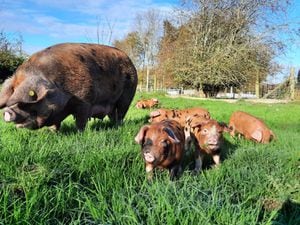Taking a dip into water grants cash pot will help the environment.
Valuable capital grants are on offer which will allow farms and estates to invest in improvements that reduce water pollution and could also save money.
However, application packs must be requested before the end of May.
Water capital grants are available either as a standalone two-year option, or as part of a wider five-year Mid-Tier agreement under the Countryside Stewardship Scheme.
Grants are available for work such as concrete yard renewal, the installation of rainwater harvesting equipment, alternative drinking sources for livestock away from watercourses and ponds, lined bio-beds and the roofing of silage camps, collecting yards, muck heaps, slurry and silage stores.
These grants provide financial support for works which will not only enhance water quality, but will also improve fixed equipment on farms at a time when it may be hard to find the money to pay for improvements.
We already know that the government wants all slurry stores and muck heaps to be covered to reduce ammonia emissions as part of its Clean Air Strategy, so this is a good opportunity to get ahead.
Applicants can have the satisfaction of knowing they are helping the environment as well as improving their farms.
The scheme is designed to improve water quality by reducing the amount of silt, nutrients and pollutants entering watercourses and aquifers.
For example, concrete yard renewal helps the environment by improving yard drainage which reduces the amount of foul drainage runoff and the risk of water pollution.
Funding can also be obtained for rainwater storage tanks, as a way of keeping clean and dirty water separate, allowing the free, clean water to be used for jobs around the farm instead of drinking-quality water supplies.
Under the standalone two-year scheme, grants of up to £10,000 are available.
The amount of grant available is unlimited if water capital items are included as part of a wider five-year application, which includes other land management options.
Farmers must be in a High Water Quality Priority Area to qualify for the two-year scheme and for certain options within the five-year scheme. In these cases, proposals which do not have the support of the local Catchment Sensitive Farming Officer will be rejected.
It is therefore important to contact the local CSFO before May 31 to discuss your proposals. Potential applicants must also have requested a Mid-Tier application pack from the Rural Payments Agency by May 31, although they have until the end of July to submit the application.
Farmers will also need to have any relevant planning consents in place to support their application.
Alistair Cochrane, Director at Strutt & Parker.





